
Background information
She didn't want to make hidden object books, now she owns the genre
by Ann-Kathrin Schäfer
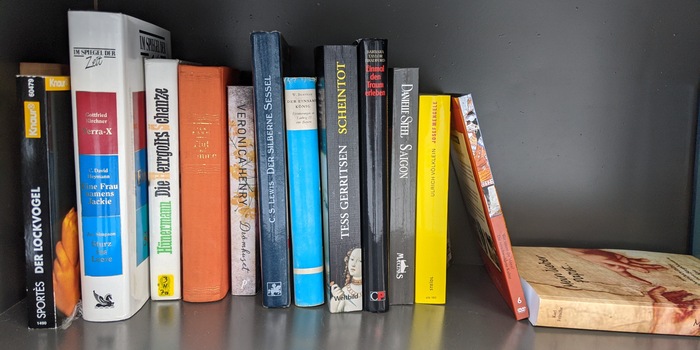
Public bookcases full of discarded books fascinate me way more than curated shelves in living rooms. They’ve got charm and tell stories that go beyond the content.
On the one hand, I truly love books. The smell of the paper, the sensual rustling as you turn the page and the intimacy that arises when you're reading. No other medium gives me such immediate access to the minds of others. It allows me to be in my own little bubble, and yet whisked away by my imagination at the same time. No distracting images, ads or comment fields. On the other hand, I have no problem parting with books. They don’t need to stay. I’m quite rational like that. At least, while space is an issue and there’s no room with a fireplace and a wall of books to speak of – the kind my heirs will have to declutter one day.
Until then, I’m happy for books to come and go. That’s what libraries are for, after all. Borrow, read, extend due date, get first reminder, finish reading, return. Keeping the content in your head if it was a good read. The book goes back. It’s that simple. A liberating act, when you consider that the jam-packed family shelving is too full to house the book adequately anyway. Books need space to come into their own. Public space by all means. A place for inspiration and exchange. That’s what I like about public bookcases, which are open to everyone. I almost prefer them to libraries.
Converted phone booths – where conversations have long since ceased – filled to the rafters with printed thoughts. Bags hanging from fences offering a hotchpotch of books. Glass-door cabinets displaying riveting reads. These aren’t just wonderful splashes of colour in any neighbourhood, but also a statement. A great contrast to our daily lives in which we’re glued to our uniform smartphones. A bookshelf screams colour and personality, brings the living room to the street and saves a bit of the world we used to know.
It will make you stop and take your time to look for something you might not find. Algorithms won’t help. But your curiosity that’s been piqued. The effect is the same for kids. I remember spending hours in the sun on a lawn in Munich. The whole family with their nose in a book, just because there happened to be a public bookcase next to the ice-cream parlour. More recently, a display case in snowy Austria made me stop in my tracks and spend quite some time flipping through pages. Maybe I like bookcases because I associate them with holidays and spare time. But most definitely also because they solve a certain problem.
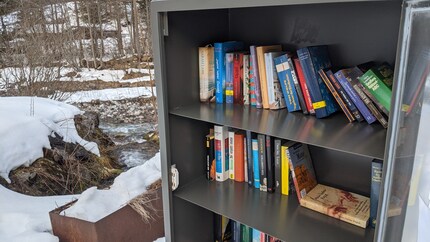
Books aren’t wastepaper. Chucking them away is out of the question. Selling them is hardly worth it, and I don’t have the heart to put them out on the pavement for people to take. It feels almost as wrong as abandoning a pet would. What if it starts to rain or a group of teens kicks them into the next bush? What if nobody wants them and I have to bring them indoors again? Not a great feeling either. My former employer had a public library, where I could leave my old books without feeling bad about it. The books got to enjoy a change of scenery for a bit and maybe got picked up by a new reader instead of lying lonely on the sidewalk. A dignified environment is a must. And that’s what all the open bookcases offer, which are plentiful in Switzerland, Germany and Austria. With the addition of a dog-eared penny dreadful, the picture is complete. The bookcases enhance rather than devalue decluttered reads.
Each privately owned bookshelf is just a bubble that reflects the world and self-image of its owner. The things we read about, the books we receive as gifts and the recommendations we get all hinge on who or what we like already. In a library, genres are clearly separated, authors are arranged alphabetically. Everything has a system. A public bookcase, however, is so diverse, it can be both confusing and inspiring. While Goethe and Bukowski are arguing in my colleague Oliver Fischer’s bookshelf, I would like to know what teenage witch Bibi Blocksberg and late movie director and Nazi muse Leni Riefenstahl talk about.
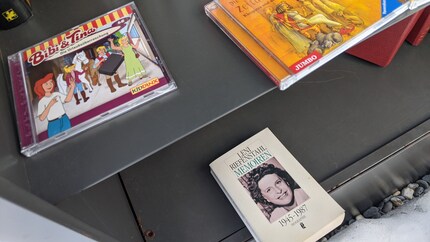
Public bookcases are happy to take in literary outcasts. This is where the most honest form of exchange takes place. It’s not curated and can be challenging at times – navigating titles that reveal different world views and preferences or simply contain a long-gone zeitgeist squeezed between the cover and the back. In case anyone’s still interested in 2022: «Not Without My Daughter», «The Internet for Dummies» and «The Outsider» are still waiting for a new reader. I reach for the maroon book that says «Kino». The cover alone has my mental cinema load a new reel.
I wonder which estate, which rustic wall unit this doorstopper came from? In any case, it’s definitely from a time when the silver screen was still big. I thumb through it, read a dead-serious part about comedy and how its tradition is traced back to pre-Columbian Mexican theatre. My mind’s eye conjures up an image of an elderly gentleman wearing horn-rimmed glasses and a sweater vest. It’s the mid-80s and he’s immersed in the book that will later become part of his life’s inventory.
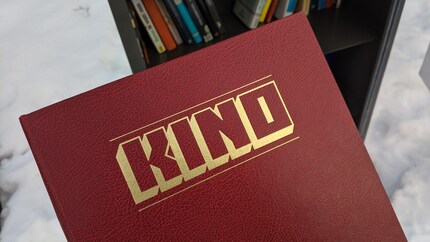
I put the book back and ask myself when I went to the cinema last. And wonder about the life Karl leads; the man the next book I take is dedicated to. It reads: «for a brother of the Order of Knights of St. Constantine and St. Helena». Most definitely a different life than that of the couple pictured on the cover of «Love on the Powder Keg». The imagery takes me right back to the ‘70s before I’m distracted by firsthand crime stories in «Murders of the Century». True crime from the 90s. But in the end, I pick a book that shakes me up quite a bit. Why? Because it’s thirty years old and yet disturbingly topical.
Whether we’re talking podcasts, series or books: we’re so accustomed to being presented with the next suggestion as soon as we’re done. You might also like... And more often than not, we take the bait. Anything that hasn’t just come out has little chance of being fully seen, heard or read. At most, they serve as a reference or footnote. At this street library in Vorarlberg, however, nothing is promoted or prominently placed. No book is placed above the rest or is adorned with shiny bestseller stickers. At first, I think I won’t find anything. But then, I end up taking one. The book I go for is Al Gore’s «Earth in the Balance – Ecology and the Human Spirit». Published in 1992.
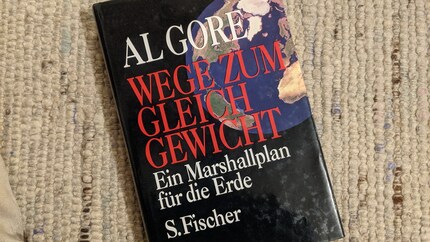
I was 11 at the time, had never heard of the future US vice president and climate change activist, and the world was a very different place than it is today. That's exactly why it caught my attention. It’s been 30 years since the book came out. Now I want to find out how he saw the world and the future in the early 90s. Was he too dramatic? Or too optimistic? Definitely, I must admit. Not only in terms of facts and figures on human-made climate change. No graph or figure has been updated for three decades. And everything’s frighteningly up to date considering 30 years have passed since then. The figures of speech also still work: «Put a frog in a pot of boiling water and he’ll jump right out, but just raise the temperature slowly and he’ll let himself be cooked.» Thirty years later, and we’re still sitting in the pot. The snow is melting all around me. It’s 14 degrees in mid-February. I keep reading what we knew many moons ago. Thanks to the public bookcase.
Chaotic, chronological, alphabetical; by colour, by size, by mood; geographical, autobiographical, thematic. We all have our own ideas about how books should be arranged on a shelf. We, the Galaxus editors, are allowing you a sneak peek into our very own bookshelves. Next up: Pia Seidel.
Simple writer and dad of two who likes to be on the move, wading through everyday family life. Juggling several balls, I'll occasionally drop one. It could be a ball, or a remark. Or both.
Interesting facts about products, behind-the-scenes looks at manufacturers and deep-dives on interesting people.
Show all